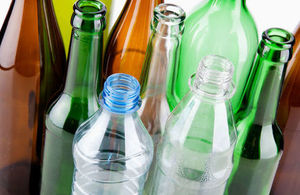Views sought on reward and return schemes for drinks containers
Environment Secretary Michael Gove has launched a call for evidence on how the littering of plastic, metal and glass drinks containers could be reduced

The government today invited views on how reward and return schemes for drinks containers could work in England by issuing a call for evidence.
More than eight million tonnes of plastic are discarded into the world’s oceans each year, putting marine wildlife under serious threat.
Up to 80% of this is estimated to have been originally lost or discarded on land before washing out to sea, and plastic bottles are a particular concern - with figures showing just 57% of those sold in the UK in 2016 collected for recycling.
This compares to a record 90% of deposit-marked cans and bottles that were returned to dedicated recycling facilities in Denmark, and a return rate of almost 80% of beverage containers in South Australia, both of which have a form of deposit return scheme.
To improve these numbers and increase recycling, Environment Secretary Michael Gove has asked organisations and individuals to share their views with the government on the advantages and disadvantages of different types of reward and return schemes for plastic, metal and glass drinks containers that could help reduce the number of bottles entering our waterways.
The call for evidence opened on 2 October for four weeks. On 27 October this was extended by three weeks to close on 20 November. This will allow as many people as possible to feed in their views on this important inquiry. Ministers have asked the Voluntary and Economic Incentives Working Group, set up as part of the Litter Strategy, to accelerate its work and report back early in the New Year - this timetable has not been altered.
Environment Secretary Michael Gove said:
We must protect our oceans and marine life from plastic waste if we are to be the first generation to leave our environment in a better state than we found it.
That means tackling the rise in plastic bottles entering our waters by making it simpler and easier to recycle and dispose of them appropriately.
Today we are launching a call for evidence to help us understand how reward and return schemes for plastic bottles and other drinks containers could work in England.
This approach has already seen great success in other countries such as Denmark in curbing plastic pollution and we want to hear people’s ideas on how we could make it work in England.
This adds to the progress we have already made in cleaning up our oceans by significantly reducing plastic bag use and drawing up one of the world’s toughest bans on plastic microbeads.
The evidence submitted will be examined by the government’s working group which includes brand and retail giants such as Coca Cola and Tesco.
This builds on successful waste initiatives already launched by the government, including the 5p plastic bag charge which has seen enormous success in changing consumer behaviour by reducing use by 83 per cent.
Some nine billion fewer carrier bags have been distributed since the charge was introduced, with more than £95million raised donated to environmental, educational and other good causes.
In addition, legislation for the government’s ban on microbeads - welcomed by campaigners as one of the toughest in the world – will be introduced later this year and we are now assessing how best to tackle other sources of microplastics from polluting the seas.
Updates to this page
-
On 27 October 2017 this page was edited to take into account the extension of the deadline of the call for evidence until 20 November 2017.
-
First published.